By Roz Brown, Public News Service (IA)
2019 is on track to be the second or third warmest year on record at a time when some Iowa farmers still are dealing with extreme spring flooding and five years of falling income.
A changing climate also fuels the pressure, but preventive measures are an option for many.
Kayla Bergman, a policy associate at the Center for Rural Affairs, says climate change is affecting Iowa's natural resources, which has consequences for population centers throughout the state and U.S. because rural areas grow the majority of our food. She recommends tools to build resiliency.
"What I mean by resiliency is building up their farm and their soils and their operation so that, when those extreme weather events happen, they are prepared for it and they can still produce some crop, or a variety of crops," she explains.
Bergman also encourages farmers and landowners to implement no-till to increase the carbon sequestration in the soil and plant cover crops.
More rural communities now are focused on renewable energy, including wind and solar, as a responsible source of energy and revenue stream.
As 2020 Democratic Party presidential candidates campaign across Iowa, state Sen. Rob Hogg has been hosting forums to hear what those running for the White House will propose to combat climate change.
"It's an opportunity for Iowans to talk directly to the candidates about climate change, and it allows us to get past some of the ideology on the issue, talking about what people are actually experiencing here in Iowa and the solutions that work in Iowa," Bergman states.
Bergman says some Iowa farmers are skeptical about climate change, but the record flooding and other extreme weather events now have them focused on solutions.
She notes that the Center for Rural Affairs can help with that when Iowans share their stories about how climate change is affecting them.
"We have numerous staff that are highly educated on the programs available for, like, financial assistance, and how to install such a thing or even where to start, so we have a lot of resources like that," she stresses.
Bergman adds that rural communities need to overcome geographic and demographic obstacles in responding to and preparing for climate change risks including physical isolation, limited economic diversity and higher poverty rates, combined with an aging population.





